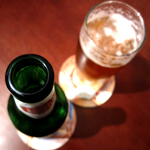 Washington University in St. Louis is one of 32 colleges and universities joining in a national initiative to reduce high-risk drinking on campuses. The participating schools are working together to bring a new, evidence-based approach to an old problem.
Washington University in St. Louis is one of 32 colleges and universities joining in a national initiative to reduce high-risk drinking on campuses. The participating schools are working together to bring a new, evidence-based approach to an old problem.
Through comprehensive evaluation and measurement techniques, The Learning Collaborative on High-Risk Drinking will identify and implement the most effective ways to tackle an issue affecting nearly four out of 10 college students nationally.
The collaborative is the inaugural effort of the National College Health Improvement Project, a joint undertaking of Dartmouth College and the Dartmouth Institute for Health Policy and Clinical Practice.
“The Dartmouth Institute has sophisticated data analysis in place and will look at outcomes data for all the schools,” says Alan Glass, MD, assistant vice chancellor and director of the Habif Health and Wellness Center at Washington University. “We’re going to test out strategies to reduce drinking, focus on reliable implementation of proven concepts and report back to each other.”
The collaborative includes several peer institutions, liberal arts colleges and large public universities. The participating teams will work with Dartmouth Institute scientists and researchers for 18 months.
Representatives from each university traveled to Dartmouth College for a learning session last June and will reconvene in January and July 2012. Each learning session will focus on a specific aspect of college high-risk drinking.
The WUSTL team includes a number of administrators, as well as John Harrison York, Student Union president and a senior in Arts & Sciences, and Josh Aiken, a Student Union senator and a sophomore in Arts & Sciences.
Universities have tried numerous strategies over the past several decades to reduce binge drinking. Despite this, the rate has remained virtually unchanged. Nearly 40 percent of U.S. college students engage in binge drinking.
WUSTL’s statistics mirror the national average. According to Glass, 38.5 percent of the university’s undergraduates engage in high-risk drinking. “Our binge-drinking rates are more or less identical to peer schools,” Glass says.
With the new partnership, the university is striving to reduce the campus binge-drinking rate by 25 percent in three years.
“High-risk and binge drinking is a national health issue and a concern for our community,” says Justin X. Carroll, associate vice chancellor for students and dean of students. “This important initiative will hopefully enable us to work collaboratively with other colleges and universities to identify new strategies for reducing risky behaviors and promoting student success.”
WUSTL already has put pieces of the plan into action.
Chancellor Mark S. Wrighton wrote a letter this summer to parents of the freshman class, encouraging them to discuss alcohol use with their kids.
In the letter, Wrighton wrote, “Even though the legal drinking age in Missouri is 21, we know that some students under 21 will choose to drink. One of my greatest fears as chancellor is that a member of our community will suffer life-altering consequences because of a poor decision made while under the influence of alcohol.”
A follow-up survey to students indicated that many parents did have those alcohol conversations.
“There is some evidence in the prevention literature that parent conversations with students can have some impact, at least in the first weeks of school,” Glass says.
The plan also calls for screening students for high-risk drinking through Student Health Services. Typically, the university provides resource referrals for students involved in high-risk drinking incidents. Now, WUSTL is amending its practice by offering students an optional abuse screen as part of medical appointments through Student Health Services.
“Our focus is on picking the student up early,” Glass says.
Beginning this month, Student Health Services also will be surveying small groups of students each month. “The logic for this is that it gives a picture in real time of how those interventions are working,” Glass says.
In spring 2012, WUSTL will conduct an all-campus student health and wellness survey, which will include questions related to alcohol use.
For a list of institutions participating in the collaborative and for more information on the collaborative, visit nchip.org.